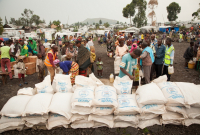Support strong Canadian climate journalism for 2025
Canada's primary subsidy for food prices in the North is failing to make food affordable there — and climate change is exacerbating the problem, says Nunavut's sole MP.
"This is supposed to be a program that helps to alleviate poverty," said Lori Idlout, the territory's MP, in an interview with Canada's National Observer. "But it is not working."
Grocery prices are routinely two to three times higher in northern Canada, fuelling widespread food insecurity in the region. In Nunavut alone, nearly half of households can't afford enough to eat.
Her comments come in the wake of testimony from representatives of the region's largest airlines and food retailers at a meeting of the federal Committee on Indigenous and Northern Affairs this month. Executives emphasized at the meeting that drought, warmer winter weather and more severe storms were increasing their costs and contributing to higher prices.
"Climate change has impacted our business," testified Daniel McConnell, the North West Company's president and CEO. The company is the largest food and goods retailer in northern Canada, with a presence in most communities from the Northwest Territories (NWT) to Labrador.
"At the best of times, the state of infrastructure in the Arctic and remote Indigenous communities makes supplying our stores challenging and costly. Weather and environmental challenges sometimes make it almost impossible," he said.
For instance, he noted a historic drought last summer made barging goods down the Dehcho/Mackenzie River impossible, forcing the company to use more expensive flights or bring ship cargo around Alaska instead. Just last week, the NWT government, which operates barge services on the river, said it will not send barges to Tulita or Norman Wells due to low water levels.
Erratic winter temperatures are also making food transportation difficult. Researchers estimate the season for ice roads – routes built across the frozen boreal muskeg, tundra and rivers – will dramatically decrease in coming years. And in January alone, the primary airline serving Pangnirtung, Nunavut, cancelled four flights delivering food and goods because above-freezing temperatures melted the community's gravel runway, said Canadian North president and CEO Shelly De Caria in her testimony.
This extreme weather is driving up the cost of food, putting even more pressure on Nutrition North. The $131-million annual subsidy is paid directly to most grocery retailers serving over 120 remote northern communities from Labrador to Yukon. Applicable only to certain foods and necessities like milk, eggs and diapers, the funds theoretically cover the region's high transportation costs and thus, reduce food expenses for consumers.
Retailers eligible for the federal subsidy are paid a set amount, which varies depending on the product and where it will be shipped. The subsidy is meant to help cover transportation and other costs. According to the program's website, retailers "must pass on the full subsidy to consumers," thereby reducing the shelf price of products relative to what they would be without the subsidy.
However, grocers aren't forced to disclose their transportation costs or their wholesale prices, making it nearly impossible to verify if they are, in fact, passing on the full subsidy. Last year, a team of researchers estimated that grocers are pocketing potentially over half of the subsidy, with the impact felt most strongly in smaller communities with only one store.
Critics have also slammed the program for prioritizing foods common in southern Canada that do not meet northern Indigenous People's cultural needs. They have also noted the subsidy is not targeted to specifically help those struggling most with poverty and food insecurity, many of whom are Indigenous. In 2021, the Inuit organization Inuit Tapiriit Kanatami released a strategic plan to bolster food security in Inuit Nunangat – Inuit homelands. The plan emphasized the need for a food subsidy program targeted at low-income Nunavummiut.
In her comments to Canada's National Observer, Idlout emphasized that while climate change does threaten food security in the North, it cannot become an excuse for an ineffective program. For instance, she said McConnell's focus on the climate crisis felt "like an attempt to try and change the conversation from how the program is not working," and downplay discrepancies between his salary and the pay his northern employees receive.
Moreover, she said the committee hearings emphasized the need for more substantial investments in northern infrastructure. From paved runways to fridges that can keep delayed food shipments fresher for longer, better infrastructure could help alleviate some of the transportation problems, she said.
But the biggest problem, she said, is a lack of political will from both the governing Liberal Party and the Conservatives. In particular, she said, the Conservative committee members used the hearings to attack the carbon tax – a policy that doesn't apply in northern Canada, and which researchers say doesn't substantially impact food prices.
"For me, [the hearings] illuminated just how much the Liberals and the Conservatives are not there to help alleviate poverty, but have their own campaigns that they're trying to push forward," she said.





Comments